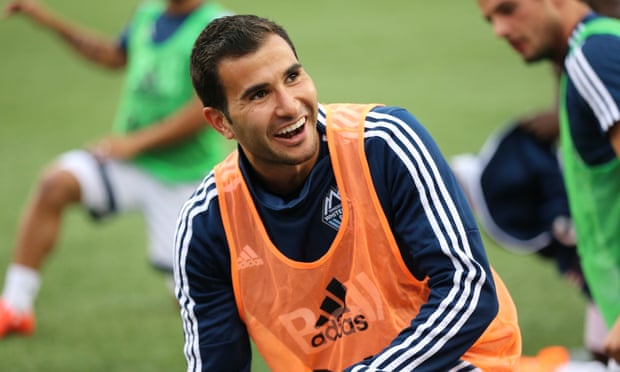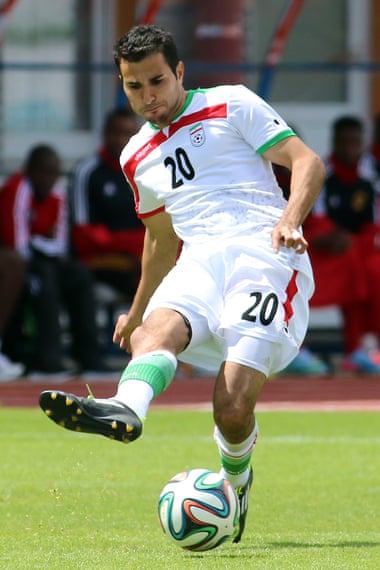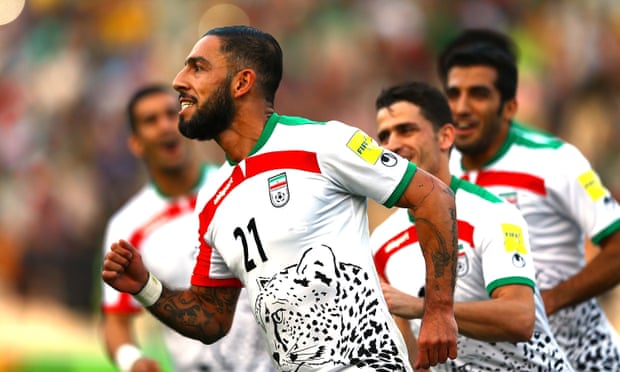
Theguardian - The Toronto FC defender is one of several dual nationals called up by Iran coach Carlos Queiroz. Could it spell a multinational future for Team Melli?
The first time Steven Beitashour arrived at the Iranian national team camp, he came with a foam roller clipped to his backpack. For Beitashour’s new team-mates – most of whom played professionally in Iran’s Persian Gulf Pro League – the foam roller symbolized the changes enacted under their Portuguese coach Carlos Queiroz. All of those long sessions on the mat or in the hydrotherapy room suddenly made sense. This was how the rest of the world trained.
Beitashour’s arrival, however, signaled more than a trend towards professionalism in Iran’s ranks. An American of Iranian descent who has spent his entire professional career in Major League Soccer, Beitashour is one of several dual-national Iranian footballers who has been called up to Queiroz’s Iran since the former Real Madrid coach first took the job in 2011.
“Carlos [Queiroz] was all about raising the bar,” former Iran assistant coach and current US under-18 men’s coach Omid Namazi told the Guardian.
“He felt that players coming from abroad, players who are training day-in and day-out in top competitive environments, professional environments were going to give the national team a different outlook because, quite frankly, the league in Iran wasn’t so professional.”
Still, that an American like Beitashour was playing for Iran at all suggests a remarkable change in attitude towards expatriate Iranians from a nation that, politically and economically, had remained cut off from the world since international sanctions were first imposed by the UN in 2006.
Blazing a path for the acceptance of dual-national players like Beitashour was the German Iranian winger Ashkan Dejagah. Born in Tehran in 1986, Dejagah moved with his family to Germany at the age of one, earning his German citizenship at 16. But despite having represented Germany at the youth national team levels, Dejagah accepted a call-up to Iran in 2011 while he was playing for Wolfsburg in the Bundesliga.
When Queiroz first called up Dejagah, some Iranian football fans expressed outrage.
“There was a little bit of a distance from the football community in Iran, because they feel [like] why not take people that have been brought up in our system into the national team as opposed to bringing some players who have never been to Iran before maybe in their lives and [who] don’t feel the same way about the colors of the country or the flag?” Namazi said.

“When [Dejagah] came in he opened the doors for others, and I think it made it more comfortable for Steven [Beitashour] as well.”
In his debut match for Team Melli in February 2012, Dejagah kicked down the doors, scoring twice in a World Cup qualification victory over Qatar and silencing the doubters. Striker Reza Ghoochannejhad – born in Mashhad, Iran and raised in the Netherlands – followed Dejagah to the national team later that autumn. Both played in the 2014 World Cup in Brazil.
But when Namazi first reached out to Beitashour in 2011, the San Jose native was only in his second season as a professional, and still held out hope for a call-up to Jurgen Klinsmann’s US team squad. In August 2012, Beitashour sat and watched from the US bench as the Americans eked out an historic 1-0 victory over Mexico at the famed Estadio Azteca in Mexico City. He remained uncapped.
So when Namazi came calling again the following year, Beitashour – who by then had not heard from Klinsmann or his coaching staff since the Mexico match – decided to take his chances with Iran. And while his preference may have been to play for the United States, Beitashour says that he first considered playing for Iran while still a student at San Diego State University. He is as proud to represent his parents’ homeland as he is his own.
“If you look at [my family’s] heritage, our culture, it’s Iranian,” Beitashour told the Guardian. “If you look at the type of foods and the traditions that we had growing up, were all Iranian. But we are living in the US, where it’s a different culture and mindset, so we are very … Americanized. But that’s why you have the Iranian American [designation], because you’re both; you’ve got the best of both worlds.”
That identification with his Persian roots served Beitashour well when he finally arrived for that first training camp in October 2013.
“I felt right in place,” Beitashour said of his arrival. “Just being Iranian, you almost feel related to [your teammates]. There’s more history than just: oh, nice to meet you. You just feel like they’re a second cousin or third cousin or something. You have that instant feeling [of recognition] with them.”
While many national teams – including the United States – have struggled to integrate their dual-national players into the culture and fabric of what can often be a fiercely patriotic set-up, Carlos Quieroz’s Iran has seen an almost seamless integration of players like Dejagah and Beitashour.
This is as much a testament to the personalities of the players – Dejagah has tattoos that say “Berlin” and “Tehran”, and another that says “Never forget where you’re from” on his neck – as it is to the strength of Iranian culture and tradition.
“The guys would actually have a little bit of fun with him, trying to teach him some words [in Farsi] and getting involved in conversations with him and his personality helped it a lot,” Namazi said of Beitashour’s first camp.
“It could have been someone who comes in and has a chip on his shoulder coming from a different league, coming from America. But Steven was very down to earth, and he blended with the whole group and the group accepted him.”
While some of Beitashour’s fellow Americans bristled at his decision to play for Iran, Beitashour himself insists that most of his own family and friends supported his decision to play for Team Melli. Nothing, he says, could have made him prouder than suiting up in the white, green, and red to represent the people of Iran.
“You’re playing for an entire country,” Beitashour said. “You’re not just playing for whatever fans are there, whether it’s 10,000, 30,000, 50,000. It’s beyond that. Every single person in the country is tuning in on their television sets and watching. You take a lot of pride in knowing that.”

Dejagah echoed a similar sentiment in a 2014 Guardian interview.
“I go [to Iran] to play football, to see my family, to represent my country,” Dejagah said. “That is what I know. I’m proud to play for Iran but a lot of people see just the negatives, the things that are reported in the news. That’s why they’re scared a bit about Iran. I can just say the Iranian people are very nice, and it’s my country.”
Evidence for this idea, that the national team transcends the politics of everyday life in Iran – politics that never failed to touch Queiroz’s squad, as crippling sanctions severely limited the team’s preparations for the 2014 World Cup – is abundant. Last year, midfielder Andranik Teymourian became the first Christian to captain Team Melli.
Expatriate crowds – from the 1998 World Cup in France to the most recent Asian Cup in Australia – have brought their political messages alongside continued and often fervid support for the players on the field. Iran’s president Hassan Rouhani even tweeted out a photo of support during the 2014 World Cup in which he can be seen wearing track pants and a tightly fitting national team shirt.
The message from fans, politicians, and the team itself seems simple: Team Melli belongs to every Iranian anywhere in the world.
“We cling to every minute of the game as if trying to prolong the sense of unity we experience when our players are on the field,” wrote the Wall Street Journal’s Farnaz Fassihi during the 2014 World Cup. “For a few hours, we allow ourselves to become a utopian nation brought together by our common love for one thing rather than torn apart by our long list of differences.”
Do the recent spate of dual-national call-ups foretell a more multinational future for a country whose expatriate population has now ballooned into the millions?
“If the ability is there and the talent inside Iran can go overseas and be trained in a professional environment, I think you’ll see them stick to their own players and their own people who have come up through their system,” Namazi said. “I really doubt that what Carlos [Queiroz] was doing is going to last, but you never know.”
Namazi, though, is optimistic that relations between the United States and Iran will soon thaw. While Iranian American Steven Beitashour could never singlehandedly bridge that divide, his warm reception in Iran is emblematic of the love that many Iranians share for both Americans and for their own Persian brothers and sisters abroad.
“People in Iran love Americans,” said Namazi. “It’s the politics that have come in between.”